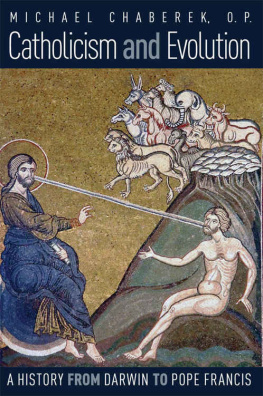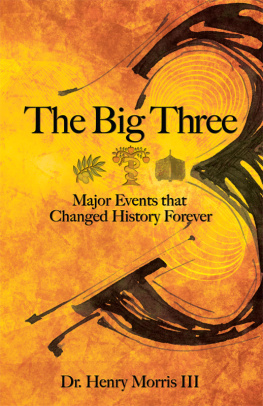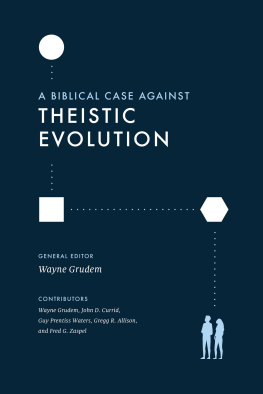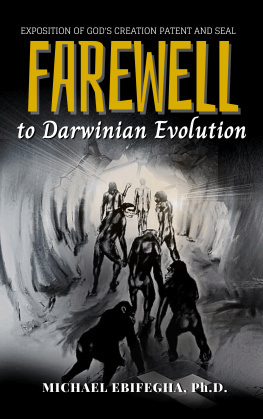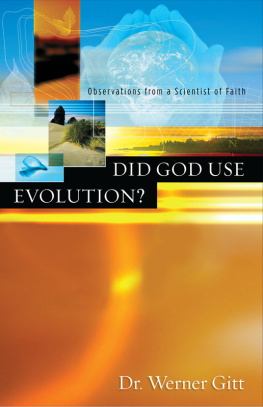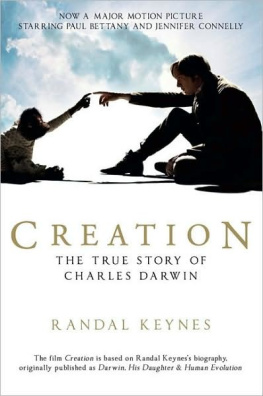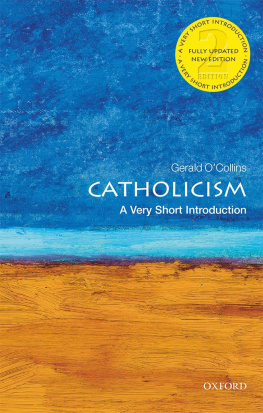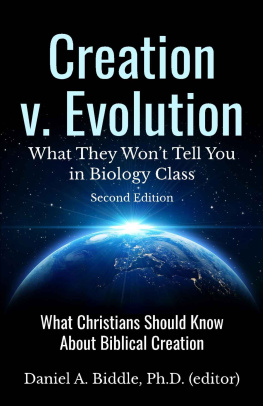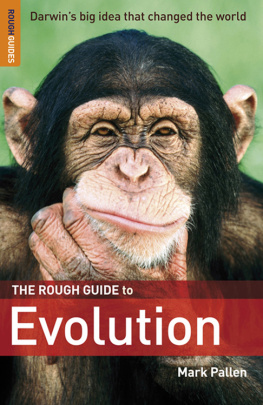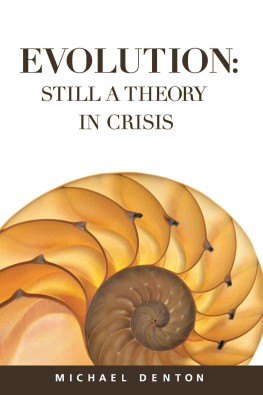Catholicism
& Evolution
A History from Darwin to Pope Francis
Catholicism
& Evolution
A History
from Darwin to Pope Francis

by
Michael Chaberek, O.P.

First published in the USA
by Angelico Press
Michael Chaberek, O.P. 2015
First published in Polish as Kocia ewolucja
(Warszawa: Wydawnictwo Fronda, 2012)
All rights reserved
No part of this book may be reproduced or transmitted, in any form or by any means, without permission
For information, address:
Angelico Press
4709 Briar Knoll Dr.
Kettering, OH 45429
angelicopress.com
ISBN 978-1-62138-137-2 (pbk)
ISBN 978-1-62138-138-9 (cloth)
ISBN 978-1-62138-139-6 (ebook)
I, Mark Padrez, O.P., Prior Provincial of the Western Dominican Province, hereby grant the Nihil Obstat and Imprimatur to Catholicism and Evolution by Michal Chaberek, O.P.
The Nihil Obstat and Imprimatur are official declarations that this book is free of doctrinal or moral error. No implication is contained herein that I, who have granted the Nihil Obstat and Imprimatur, agree with the contents, opinions, or statements expressed. 3/12/14
Cover Image:
Cathedral of Monreale, Palermo, Sicily:
Mosaic of the Creation of Adam, 118os
Cover Design:
Michael Schrauzer
CONTENTS
Acknowledgments
Work on the American edition of Catholicism and Evolution was a long process involving many individuals to whom I would like to express my very great appreciation. No human work is perfect, but there are some individuals whose valuable and constructive editorial input made this work significantly better. For all the remaining shortcomings of this book the author, and he alone, remains responsible. Specifically, I would like to express my deep gratitude to Professor Jay W. Richards, whose time and effort at early stages helped to significantly improve the translation of this work. I am also greatly indebted to Professors Jonathan Wells and Michael Behe, who helped mea non-biologistaccurately discuss the scientific matters treated in this work. Special thanks should also be given to all those who provided me with technical and moral support during the most intensive work on the manuscript, especially the staff of the Discovery Institute and my Dominican community in Seattle. Above all, however, I would like to extend words of particular gratitude to Bruce Chapman, without whose initiative, patient guidance, enthusiastic encouragement, and useful critiques the publication of this book would not have been possible.
Introduction
B EGINNING WITH the 1859 publication of Charles Darwins Origin of Species, the discussion about evolution has been a constant ingredient in modern life, predictably flaring up with each decennial anniversary of its publication. Why did this one book arouse more interest, polemic, passion, and argument than all other works on natural science of the 19th and 20th centuries combined? That is the question this book intends to address.
Darwin was the first naturalist to propose a systematic and scientific theory explaining the entire biological complexity of the world without reference to supernatural or intelligent causes. The English scholar was mainly interested in finding a purely natural answer to the question of the origin of biodiversity on Earththat is, the origin of species. The new concept provoked both support and opposition in the scientific community as well as in the clerical circles of various Christian denominations.
It is difficult for a contemporary believer to understand the reactions of religious leaders of the time. Indeed, many Christians have come to terms with the possibility that God may have used evolution in creating the world. Drawing on older accounts, Christian scholars have developed various concepts of causality which, they claim, can reconcile the randomness of evolutionary processes with purposive divine action. Modern exegetes explain difficult passages from the Book of Genesis, using historical and critical methods that often do more to explain away than to explain. But even if we define the literary genre of the first chapters of Genesis as a poetic hymn telling of Gods glory, this does not solve the issue of evolution. It does, however, serve to allow the idea of evolution to be considered within a theological framework. Finally, as more and more discretion in biblical interpretations is accepted, the inspired text suddenly comes to appear as so ambiguous that neither truth nor dogma can be validated by Gods word.
This was not always the case. For almost two thousand years, the universal belief of Christians (and Jews) was that God used His power to create the various species separately, that He created man directly from the dust of the earth, and that He took Eve from Adams side. The Holy Bible was interpreted as a true historical account, and the constancy of species was seen as a manifestation of Gods Wisdom, which ordered this world according to measure and number and weight (Wisdom 11:20). This understanding of creation permeated the Western culture of Darwins time.
When Darwin proposed a new explanation of beginnings, the generic idea of evolution as the transformation of living beings into different living beings was not unknown. Ancient Greek philosophers were already familiar with the search for a material cause of all reality. Naturalistic and emanational cosmogonies dominated ancient pagan culturesideas that the Church Fathers combated with great zeal in the early Christian era. Darwins key contribution was not species transformism or materialism, but a proposed mechanism that suggested that a purely natural, scientific answer to the question of origins had been found. Thus, the idea proposed by Darwin challenged not only science but also longstanding religious beliefs. In that context, it is no wonder that this new theory provoked opposition and discussion, and indeed continues to do so to this day.
Many Catholic theologians now claim that the Church never had a problem with Darwins theory. It is often said that Darwins work is not a challenge to faith, as it is a scientific rather than a religious concept. Some even claim that evolution presents a better picture of God than the theory of direct creation, since a God who works through secondary causes is more perfect than one who would have to create everything separately, and, in a way, intervene in His own work.
But is it really possible to reconcile evolution with the Book of Genesis, and, if so, what would the resultant concept of creation look like? What are the limits of science in addressing questions about the origins (of the world, species, man), and what should be accepted from revelation and theology? These questions are significant, since they touch upon the Christian understanding of creation as well as the essential questions faced by every human being: Where did I come from? How did the world come to be? Where is it headed? The answers to these questions shape our views of man, of the world, and of God himself.
In this book I argue that the Catholic Church has not taken an unambiguous stand on evolution. Catholicism currently lacks a straightforward answer to the question of whether evolution, understood as the origin of species, is compatible with the Churchs teaching.
Furthermore, until at least the middle of the 20th century, the Church maintained a coherent and clearly expressed position (on the level of the ordinary teaching) on the issue of the direct creation of man, with reference to the soul and the body. Therefore, the opinion that the Catholic Church never had any difficulty with Darwins theory contradicts what is found in Church documents. It is my intention to demonstrate that the present teaching of the Church allows a plurality of views on this matter; in fact, the Church currently authorizes mutually exclusive ideas, such as theistic evolution and progressive creationism. This necessitates further analysis of the problem, and discussion on the matter is by all means justified.
Next page
